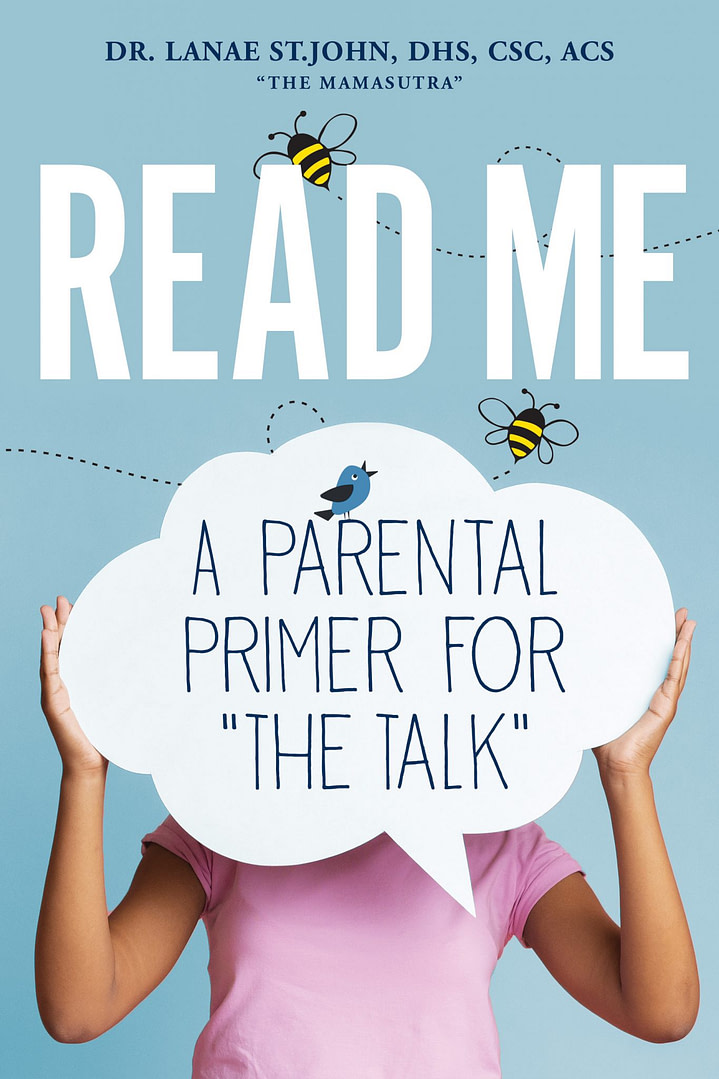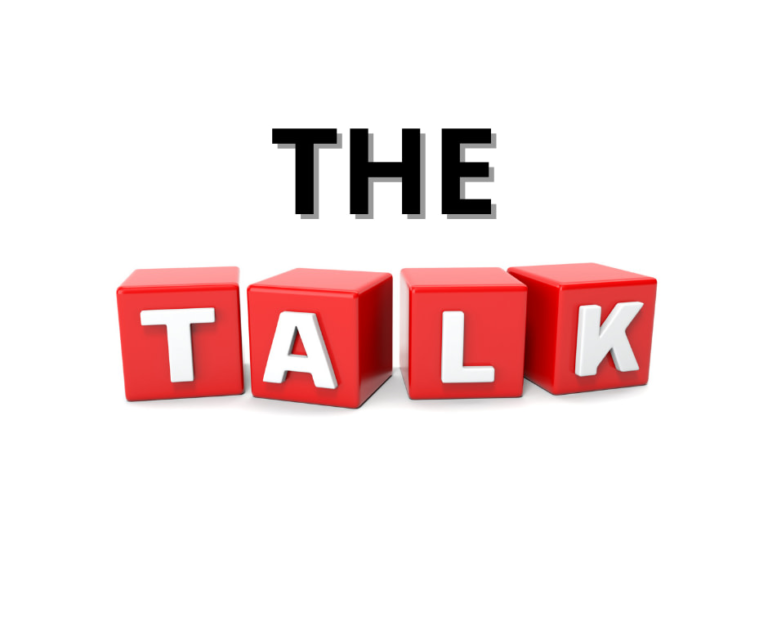So it’s time to have “the talk” with your kids.
You might have no idea what to say.
Whether you aren’t sure what is age-appropriate, how your kids will react, or never had the sex talk with your own parents, there are plenty of reasons that having “the talk” might make you nervous. That’s okay! Having the talk is tricky. Trust me, I know. I’m a board-certified sexologist and I had to wrap my mind around how I would approach sex and all that went with it to my own kids.
Here’s the thing: “The Talk” isn’t actually just one conversation.
It (meaning the conversations around sex, dating, relationships, gender, decisions, sexually transmitted infections…I could go on) isn’t about acts or positions either. It is a series of conversations done early on and continuing over the course of the tween and teen years as they transition into young adults.
It might make you uncomfortable to think you could say the wrong thing. Or perhaps, you worry you’ve waited too long. (Hint: It’s never too late to be open with your kids about sex.)
The truth is, as much as we want to shield our kids, they will inevitably see and hear things when you’re not around.
Whether it is a smartphone on the playground or an inappropriate movie at a slumber party, they are going to come home with questions. It’s better for kids to get the facts from a reliable source.
That means…YOU.
When it comes to sex education with your children, it is not just one conversation; it’s an ongoing conversation over the course of their lives as you prepare them for adulthood.
When to Have the Sex Talk
When children start asking questions, it’s time to talk about it. It’s best to answer a child’s questions honestly and factually, even if you aren’t ready to have that conversation.
If you lie and they find out the real answer, you’re proving to them you either don’t know what you’re talking about or you can’t be trusted. Both outcomes undermine you.
It is okay to say you don’t know all the answers to their questions. If your parents didn’t talk to you, admit that. Then promise to get an answer and get back to them or offer to research the question together. But please do not lie or make things up.
This process is a lot like teaching your kid about using the stove.
When they’re toddlers, you tell them not to touch it because it’s hot. Usually with a gesture indicating to avoid the entire stove. That might be all they can understand at that point.
As they get a little older, we give them more specific instructions as to how, when, and why they should be careful with the stove. We tell them when a burner is lit or an indicator light is illuminated, that means the stove is hot.
Eventually, we teach our children how to use the stove to start cooking. We teach them how to do so using reason, logic, and empathy. Having the talk isn’t all that different. The teachable moments around sexual health evolve as the child grows. We certainly don’t show toddlers pictures of third-degree burns to make a point.
I think if parents realized those early conversations that led up to the tough questions were parts of the Five Building Blocks to Healthy Sexuality, they’d have an easier time with it. After all, you don’t teach calculus to preschool children.
You start first with basics, like counting blocks.
My Five Building Blocks are:
- Communication – This starts as early as toddlerhood. Think about your child when they first discovered their own genitals and asked you what things were. Honest communication shows your child that you are a trusted resource.
- Consent – Again, this starts early. Teaching a child about consent isn’t just about sexual relationships. It’s about letting them know they have the ability to say who touches them and who doesn’t. Remember those Santa pictures with kids crying in fear? Consent is about more than sex. It’s about letting your child know they have control over their body. No matter the child’s age, there are many teachable moments about consent.
- Respect – We are currently experiencing a culture of disrespect all around us these days. Teaching children respect for themselves and others is a characteristic that can help them throughout their lives, especially in their own sexual health.
- Pleasure – Adults have the hardest time with pleasure because they immediately think sexual pleasure. It’s not. Part of pleasure is about the beauty and simplicity of human touch. A hug, when desired, can be a remarkably soothing act and it doesn’t have to do with sex.
- Fantasy – Okay, you’re not talking to your three-year-old about sexual fantasies. Fair enough. But you can tell your teenager how fantasy plays a role in sexual relationships. How else are you going to answer about adult films?? At the very least, if we aren’t talking with them about sex, we need to explain that everything else they see in the real world is someone else’s fantasy about sex.
How To Talk To Older Kids About Sex
If your child is older, don’t put this conversation off any longer.
If you’re wondering when to begin, take note of any signs they’re getting curious, like movies they’re watching, books they’re reading, etc.
You can use this as an opportunity to start an ongoing conversation.
If you need a little help getting started, I’ve found this template does wonders:
“My parent(s) didn’t talk to me about this, and I kinda wish they did. I’m nervous now talking to you about this, but I want to be here for you because there’s a lot of information out there and not all of it is good. I want you to have the correct answers. If I don’t know the answer, I’ll go find out and get back to you.”
While it may feel awkward at first, it is an important part of your child’s sex education. It also models safe communication in healthy relationships, which is another important aspect of a healthy sex life.
Practical Tips on How to Talk to Kids About Sex
I know this topic brings up many emotions for people. As you prepare to engage with your children on this, keep these six tips in mind.
- Do your best to stay present. Don’t allow yourself to become paralyzed with fear and avoidance. Talking about this now will help your child develop into a healthy adult.
- Plan ahead. Parents, talk to each other. What worked or didn’t work for you when you were growing up? Make a plan for who will say what. Try to give only accurate, matter-of-fact, honest information to your child.
- Start talking early and do so often. This is as much for your child’s benefit as it is for your own—practice having casual conversations about sex! The more comfortable you are using proper terminology for body parts, the less awkward things are later. If you see something noteworthy on the TV or a billboard along the road, talk about it. If you’re wondering what they know, ask.
- Know why you feel the way you do about the talk. Take the time to examine why you feel the way you do—especially if you are preaching something other than what you practiced in your own personal life. If you feel shame, do you want to pass that on to your kids?
- Keep it simple. Many parents think having the talk means they have to explain different positions and terms right off the bat. But it’s more basic than that. Many children, and adults for that matter, want to know that what they’re experiencing is normal. They want facts and accurate information. Help them get it.
- Listen to your kid. We all know what it feels like to be talked AT instead of someone talking WITH us. Pause throughout the conversation and ask what they’re thinking. Listen to the answers in whole and try (TRY) to take yourself out of it. Your child is their own person and may have different reactions than you did at their age. You may be surprised with their responses.
We can get paralyzed when we don’t know what to say or when to begin.
Use the Five Building Blocks to a Healthy Sexuality in my book, Read Me: A Parental Primer for “The Talk”, to guide you to have regular conversations you feel comfortable with so you can get through the talks with your kids.

You’ll be glad you did and you’ll want to share the book with other parents so kids can grow up into a happy, healthy adult sexuality.
As a gift, I’ve also prepared a special resource for you!
Download my 5-page guide featuring 35 Conversation Starters for Having “The Talk” plus a Mad Libs style fill-in-the-blank script
I really want to make this easy for you and a positive experience for both you and your child.
xxoo
Lanae

